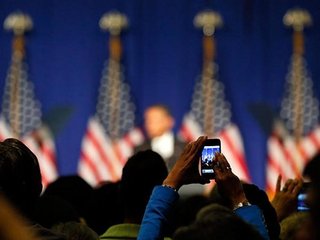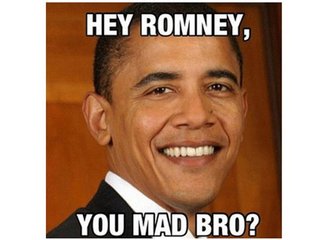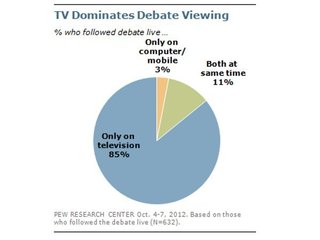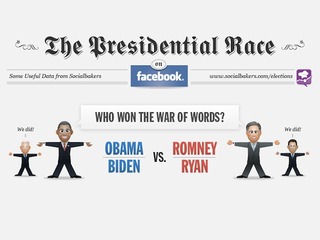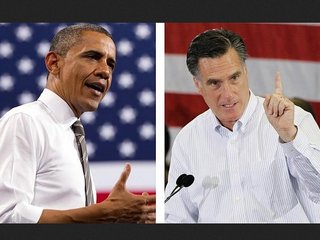New disease models unlocking secrets to neurological research
Advances in technology, like in vitro and microfluidics, have helped advance research
Read more...
The political landscape has changed markedly in the last four years, and not just in regard to the policies themselves or even the fact that a totally new political group—the Tea Party—has cropped up as an outgrowth of Midwestern malaise with the liberal government. Specifically, the way that people relate to and interact with political campaigns has changed.
The way candidates have reached voters has seen a dramatic evolution over the years. In the interest of full disclosure, I’ve only been legally allowed to vote in the last three presidential elections, so I don’t have any personal experience with the days of listening to debates on the radio, but I do remember a time when candidates didn’t think much of campaigning online.
Now, mobile devices, social media, and online video have transformed the way that voters engage with campaigns—and technology is forcing politicians to be more careful about what they say.
Mobile Devices
I had this life-changing experience (that might be hyperbole) while watching the second round of debates. Romney and Obama were arguing about oil production on federal land. I wouldn’t have cared one way or the other about which candidate is the most pro-oil if Obama hadn’t been so insistent that Romney was flat-out, bald-faced lying. Ordinarily, I would’ve let it go and just shrugged it off as something that doesn’t matter to me anyway (I’m more interested in the sexy social issues). And then I remembered I had my iPhone in my pocket, so I whipped it out and Googled the topic—and it turned out that what Romney said was technically true, but only for 2012. Oil production had been up every year previously though.
The ability to fact-check Obama and Romney on-the-spot made me drunk with power, and I started doing it with just about everything they said (it was very time consuming).
Fully one-in-ten Americans “dual-screened” the debates—meaning they watched the debates on their TVs while simultaneously catching debate coverage on a computer or mobile device. A total of 14% of Americans watched the debates on a computer/mobile device either exclusively or in simultaneity with the TV coverage.
Another study found that fully 35% of voters with smartphones have used their devices to look up the factual accuracy of something a politician has said. To be able to check on a dubious number or factoid as soon as it emerges from a candidate’s petroleum-jellied mouth means politicians—especially presidential candidates—can’t just go making up their own facts and numbers in the hopes that people will forget to look it up.
Mobile devices also have an interesting capacity for use as stealth video cameras…
Online Video
Every presidential hopeful has had some embarrassing gaffe, but for some, it may have cost them the election. For Howard Dean, it was a wild squeal on stage while campaigning for the Democratic nomination in 2004. For Michael Dukakis (who campaigned against George Bush senior in ’88), many believe it was the infamous photo op in which he strapped on an oversized helmet and road around in an army tank.
For Mitt Romney, many were the gaffes (“I know what it’s like to worry about whether you’re going to get fired. There were a couple of times I wondered if I was going to get a pink slip.”) Obama had his share of gaffes as well (the infamous “you didn’t build that” remark). But the one that likely sank the Romney ship was the notorious “47%” speech.
In September, a video leaked showing Mitt Romney telling a room full of wealthy (white) donors that the 47% of Americans who don’t pay income tax see themselves as victims, and they’re going to vote for Obama because they believe they’re entitled to free food, shelter, and health care. He also joked about how the election would’ve been in the bag if he had been Latino—indeed, that life would be easier if he were Latino (because if he were Latino, he would’ve grown up in private schools and graduated from Harvard debt-free—oh wait…).
47% of Americans who don’t pay income tax see themselves as victims, and they’re going to vote for Obama because they believe they’re entitled to free food, shelter, and health care. He also joked about how the election would’ve been in the bag if he had been Latino—indeed, that life would be easier if he were Latino (because if he were Latino, he would’ve grown up in private schools and graduated from Harvard debt-free—oh wait…).
First of all, the video was an amazing example of what happens when you forget that technology is ubiquitous and always on—especially if you’re in the public eye. The person who shot the video (believed to be the bartender or wait-staff) most likely did so with a smartphone. But apparently, even though the guests had been sworn to secrecy, no one thought to ask the help to turn in their phones.
Equally important, though, is the virality with which the video spread. More than half (55%) of all registered voters in this election cycle said that they’ve watched political videos online, according to a Pew Research study. Online video goes hand-in-hand with social media—while 55% of all registered voters say they’ve watched any political video online, fully 40% say that videos have been recommended to them by friends via social media.
Which brings us to social media…
Social Media
A full 66% of social media users—or 39% of the general adult population in the U.S.—have engaged in some form of political activity online, whether they’ve simply “liked” material related to political or social issues, posted their thoughts on an issue, repost content, or encouraged others to vote.
 In and of itself—this is unprecedented. We all know the old mantra: never bring up politics or religion at a party. That’s surprisingly easy to do (unless you’re my Tea Partier mother who LOVES being offensive—or you’re a bleeding heart liberal like me, who LOVES getting offended). What’s not so easy to do: avoiding any and all political affiliation on a social networking site like Facebook, where you’re simultaneously interacting with friends and luxuriating in a vacuum of your own making.
In and of itself—this is unprecedented. We all know the old mantra: never bring up politics or religion at a party. That’s surprisingly easy to do (unless you’re my Tea Partier mother who LOVES being offensive—or you’re a bleeding heart liberal like me, who LOVES getting offended). What’s not so easy to do: avoiding any and all political affiliation on a social networking site like Facebook, where you’re simultaneously interacting with friends and luxuriating in a vacuum of your own making.
I’m willing to bet that every social media user has, at some point in this election cycle, had to block someone. Nevertheless, people can’t avoid the issues—they’re being talked about, whether directly or indirectly—and you can only do so much to stay out of the conversation.
Now, that being said, liberals are more active on social media platforms than conservatives—particularly on Twitter. Watching the televised debates and the Twitter coverage at the same time was very refreshing for my little liberal soul.
But conservatives are catching up, which is shifting the direction of the conversation.
“Now that more than half of adults use social media, these technologies have worked their way into the rhythms of people’s lives at many levels,” said Pew Internet & American Life director Lee Rainie, in a statement. “At the height of the campaign season, it is clear that most social media users, especially those who care about politics, are using the tools to debate others, stay in touch with candidates, flag political news stories and analysis that are important to them, and press their friends into action.”
The Obama campaign was much better at leveraging social media than the Romney campaign. Pew researchers found that over the course of two weeks, the Obama campaign published 614 social media posts while the Romney campaign published 168 posts. Nowhere was the discrepancy more visible than Twitter, where the Obama camp averaged 29 tweets a day while the Romney camp averaged just one tweet per day.
Net Result
I won’t pretend to be unaffiliated—if I could marry Barack, Michelle, Sasha, and Malia, I would. But it’s clear that Romney made all the wrong tech moves. He underestimated the power of mobile devices, he overlooked impact of the viral video—otherwise he would have been far less gaffe-prone, and his campaign didn’t push the social media front as effectively as they could have.
To be fair, Romney gained a lot of tech ground that McCain lost in the last election, when he admitted he didn’t even know how to check his email and had his wife and advisors read political blogs to him. Romney’s campaign did target social media and even announced his VP pick, Paul Ryan, via his mobile app.
But it’s going to take more than that to win. As social media, mobile devices, and online video become ever more ubiquitous, politics will become more relatable and accessible to younger voters—those who tend to be more tech savvy and who tend to skew more liberal. If conservative campaigns are going to win the hearts and minds of more politically engaged young people, they’re going to have to tech up.
Advances in technology, like in vitro and microfluidics, have helped advance research
Read more...Robots are taking over the heavy lifting work inside warehouses
Read more...The company also expanded access to 12 different provider types for male fertility care
Read more...